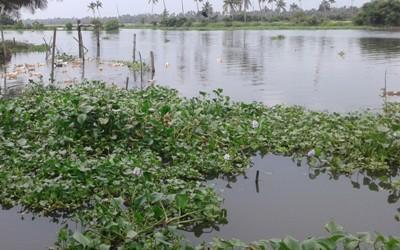KOCHI, 12 April 2019 : In a major attempt to build resilience against impact of climate change, the Central Marine Fisheries Research Institute (CMFRI) and the Indian Space Research Organisation (ISRO) have joined together to map, validate and protect smaller wetlands in coastal region aimed at restoring them through coastal livelihood programmes.
A Memorandum of Understanding (MoU) was signed between the CMFRI and the Space Applications Centre (SAC) of the ISRO to develop a mobile app and a centralised web portal with a complete database of wetlands that are smaller than 2.25 hectares in the country.
Such smaller wetlands cover an area of more than five lakh hectares across the country, while Kerala having as many as 2592 smaller wetlands.
As per the MoU, the two scientific institutes aim to identify and demarcate wetlands, and restore the degraded wetlands through suitable livelihood options like coastal aquaculture.
The app will be used for real-time monitoring of the wetlands and giving advisories to stakeholders and coastal people.
The collaborative move is part of a national framework for fisheries and wetlands recently developed by the National Innovations in Climate Resilient Agriculture (NICRA) project of CMFRI. The NICRA project aims to find ways and means to mitigate the impact of climate change in marine fisheries and coastal region.
According to the MoU, the National Wetland Atlas, already developed by the SAC, will be updated with real-time data of physical, chemical and biological parameters of the wetlands to be provided by the CMFRI.
Dr P U Zacharia, Principal Scientist and Principal Investigator, NICRA project of CMFRI said the real-time data of demarcated coastal wetlands would greatly help developing a conservation plan for degraded wetlands in the region besides utilising these resources for livelihood prospects such as shrimp and crab farming in the area.
“Smaller wetlands across the country are highly in neglected state owing to multiple reasons. Climate variability induced rainfall drastically changes the physio-chemical characteristics of such wetlands which was evidently seen during the last year’s devastating flood in Kerala. The collaborative initiative will help develop a comprehensive wetland information system which could facilitate the village level wetland advisories to the local people by scientific communities”, he said.
“Wetlands are highly prospective for some selective aquaculture ventures that will help local people earn economical gains” Dr Zacharia added.
The CMFRI would play lead role in generating periodic field-level wetland datasets such as water quality, sediment quality, biodiversity and species health with the support of other fisheries research organisations and stakeholders. The institute would also seek the support of the local people engaging with aquaculture practices on these resources for real-time data collection, he said.
This is the first national instance that a fisheries institute is collaborating with ISRO to develop a comprehensive climate resilient framework for fisheries and wetlands. Real-time wetland advisories could enhance climatic resilience of smaller wetlands in the country.




















